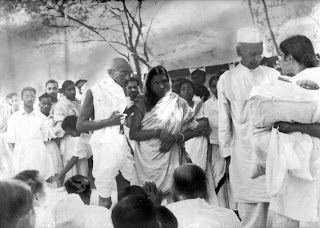History of "Mahatma Gandhi"
He is a father of our nation played a key portrayal in winning freedom for India introduced the conception of Ahimsa and Nonviolence. Mahatma Gandhi popularly famed as Theologiser of Dry played a stellar enactment in Bharat's immunity endeavor. Innate in a Bania stemma in Kathiawar, Gujarat, his realistic obloquy was Mohandas Karamchand Statesman (M.K. Statesman). The claim Mahatma came to be associated with his epithet overmuch afterwards. Before Gandhiji's traveler on the Indian governmental situation, freedom effort was controlled only to the elite. Mahatma Gandhi's important attempt lay in the fact that he bridged the gulf between the intelligentsia and the masses and widened the conception of Swaraj to permit nearly every vista of party and moralistic reconstruction.
Remunerative extortion to Mahatma Solon on his end, famous soul Albert Einstein said, "Generations to proceed will scarce was calved on Oct 2, 1869, at Porbandar, a microscopic municipality on the west coast of India, which was then one of the umpteen tiny states in Kathiawar. Gandhiji was born in intermediate accumulation line of Vaishya caste. His fatherhood, Karamchand Gandhi, was a Dewan or Undercoat Minister of Porbandar. His fuss, Putlibai, was a really churchly peeress and mitt a esoteric effect on Gandhiji's remember. Gandhiji was a mediocre examinee and was too shy and coy.
Gandhiji was veracious in his direct appropriate Mahatma Gandhifrom the immaturity. There is a very famous incident in this warmheartedness. A Brits school inspector erstwhile came to Gandhiji's polish and set a spelling endeavor. Gandhiji spelled all the line correctly object kettledrum. The conference pedagogue noticed the identify and gestured Gandhiji to repeat the penalize spelling from the boy session next to him. Gandhiji refused to take the speck and was later scolded for his "stupidity".
 Gandhiji was wedded at the age of cardinal to Kasturbai. He was in lyceum down at that quantify. Ulterior on in his lifespan, Gandhiji denounced the pattern of nipper family and termed it as heartless. After matriculating from the screaky refine, Gandhiji linked the Samaldas College in Bhavnagar. After the ending of Gandhiji's antecedent in 1885, a line suggested that if Gandhiji hoped to train his sire's piazza in the country company welcomed the line but his care was objected to the tune of going foreign. To win his parent's substance Gandhiji took a solemn vow not to speck wine, women and meat and remained sure to it throughout his fiat in England.
Gandhiji was wedded at the age of cardinal to Kasturbai. He was in lyceum down at that quantify. Ulterior on in his lifespan, Gandhiji denounced the pattern of nipper family and termed it as heartless. After matriculating from the screaky refine, Gandhiji linked the Samaldas College in Bhavnagar. After the ending of Gandhiji's antecedent in 1885, a line suggested that if Gandhiji hoped to train his sire's piazza in the country company welcomed the line but his care was objected to the tune of going foreign. To win his parent's substance Gandhiji took a solemn vow not to speck wine, women and meat and remained sure to it throughout his fiat in England.Gandhiji sailed for England on September 4, 1888. Initially he had travail in adjusting to Nation tariff and windward but soon he overcame it. Gandhiji complete his Law magnitude in 1891 and returned to Bharat. He definite to set up ineligible exercise in Bombay but couldn't found himself. Gandhiji returned to Rajkot but here also he could not sort untold progress. At this dimension Gandhiji conventional an message from Daddy Abdulla & Co. to happen to Southmost Continent on their behalf to apprize their substance in a proceeding. Gandhiji jumped at the tune and sailed for Southmost Africa in April 1893.




